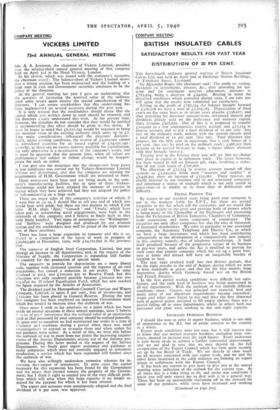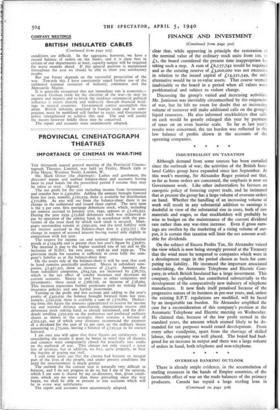COMPANY MEETING
BRITISH INSULATED CABLES
SATISFACTORY RESULTS FOR PAST YEAR DISTRIBUTION OF 20 PER CENT.
THE forty-fourth ordinary general meeting of British Insulated Cab!es Ltd. was held on April and at Exchange Station Buildings, 37 Tithebam Street, Liverpool.
Sir Alexander Roger (the chairman) said : The profit on trading, dividends on investments, interest, &c., after providing for tax- ation and for contingent reserves adjustment, amounts to £783,224, being a decrease of f,24,65o. Bearing in mind the disturbed conditions which prevailed during 1939, I am sure you will agree that the results now submitted are satisfactory.
Adding to the profit of £783,224 the balance brought forward of £486,558 we have a total of £1,269,782. Depreciation of fixed assets on the same basis as in recent years absorbs £158,617, and after providing for directors' remuneration, debenture interest and dividends already paid on the preference and ordinary capital, there remains £901,639. Out of this it is proposed to transfer £100,000 to a war contingencies reserve account and £13,334 to reserve account, and to pay a final dividend of to per cent. (less tax) on the ordinary stock, making with the interim already paid a total dividend of 15 per cent. (less tax). Your directors also propose, for the fifth year in succession, that a cash bonus of 5 per cent. (less tax) be paid on the ordinary stock ; £488,305 then remains to be carried forward to 1940, a figure almost identical with that brought forward.
Turning now to the balance sheet you will see that no change took place in capital or in debenture stock. The latter, however, has been repaid in full on January 4th, 1940, involving a reduc- tion of our cash assets of £721,000.
The allocation of £13,334 to reserve account rounds off that account to £1,5oo,000 while total " reserves and surplus " at £2,438,305 show an increase of £115,081. These reserves are chiefly invested in our business and in our associated companies and constitute a source of strength which is not only useful in peace-time—it is doubly so in these days of dislocation and difficulty.
EXCESS PROFITS TAX
By reason of our standard years being good your company is not at the moment liable for E.P.T., but there are several inequities in the Act which call for correction, and we would like to add our weight to the great and growing body of protest which is being mad:. to the Chancellor of the Exchequer and emanating from the Federation of British Industries, Chambers of Commerce, trade associations and many companies of importance. The inequities not only affect companies but also the tens of thousands of interested shareholders. We refer in particular to our associated company, the Automatic Telephone and Electric Co., in which we have a large investment and which has been contributing substantially to the development of a comparatively new industry in this country, namely, that of telephone manufacture. It finds itself penalised because of the progressive nature of its business in pre-war years, and unless the Act is modified to provide for such cases that pioneer company which has set up a great busi- ness at home and abroad will have 'an inequitable burden of taxation to bear.
The year 1939 resolved itself into two distinct periods, that for the eight months to the end of August, during which we were at least nominally at peace, and that for the four months from September, during which Germany forced war on the British and French Empires. In the first period trading conditions were difficult but satis- factory, and the 1938 level of business was being maintained in all our departments. With the outbreak of war entirely different conditions arose. Copper, our principal raw material, lead and many other of our important requirements became controlled ; wages and other costs began to rise and after the first abnormal rush of general orders designed to fill empty shelves, there was a partial falling off in some departments, whilst in others both our personnel and plant were working to day and night capacity.
INCREASED OVERSEAS BUSINESS
I should like now to refer to export business, which is not only of importance to the B.I. but of prime concern to the country as a whole.
Export trade conditions were not easy, but it will interest you to know that our normal overseas business, excluding large con- tracts, showed an increase over the 1938 figures. Every endeavour is now being made to achieve a further substantial improvement, and we are glad to note that we may depend on the full co-operation of the Export Council which has been quite recently set up by the Board of Trade. We are already in close touch on all matters concerned with our export trade, and we and the other firms interested in the cable industry are forming an export group to collaborate with the Export Council. It has been my custom in past years to give you at the annual meeting some indication of the outlook for the current year. 'At all times this is a risky thing to do, and under war conditions I know you will only expect me to deal with it in a general way. There has been an unavoidable slackening off in the demand for some of our products, while costs have increased and working (Continued on page 504) COMPANY MEETINGS
BRITISH INSULATED CABLES (Continued from page 503)
conditions are difficult. In the aggregate, however, we have a record balance of orders on the books, and it is clear that in certain of our departments at least, capacity output will be required for many months ahead. If this general position is maintained throughout the year we should be able to show you satisfactory results.
But our future depends on the successful prosecution of the war. Towards this I have consistently urged further use of the unlimited national resources of industry, commerce and the Mercantile Marine.
It is generally recognised that our immediate aim is economic— to smash German trade for the duration of the war—to stop its exports and imports and to break the insidious commercial political influence it exerts directly and indirectly through financial hold- ings in neutral countries. Government cannot accomplish this alone. British industry, practised in foreign trade and its com- petition, must be mobilised still further to assist, and Government policy strengthened to achieve this end. The end will justify the means however boldly these may be conceived.
The report and accounts were unanimously adopted.















































 Previous page
Previous page